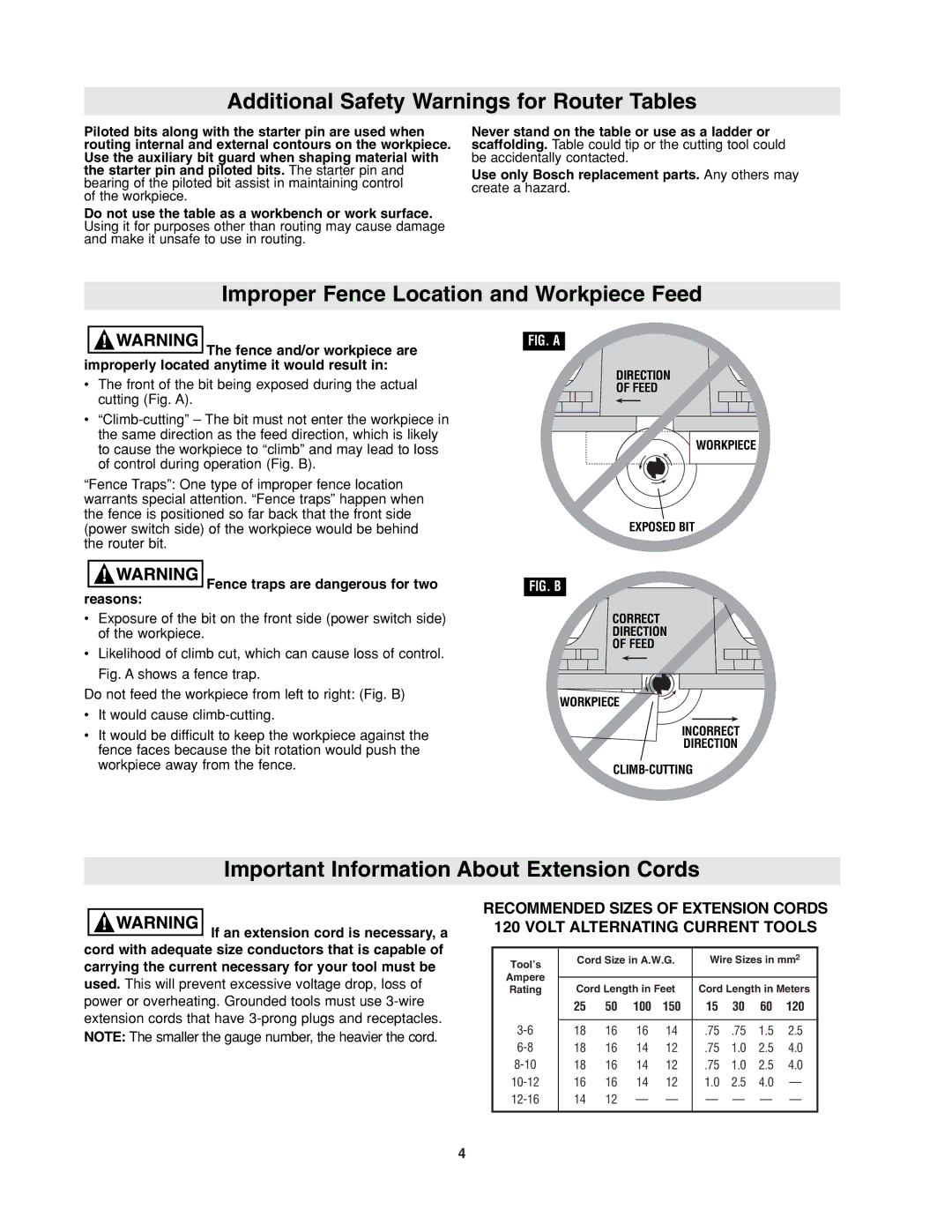
Additional Safety Warnings for Router Tables
Piloted bits along with the starter pin are used when routing internal and external contours on the workpiece. Use the auxiliary bit guard when shaping material with the starter pin and piloted bits. The starter pin and bearing of the piloted bit assist in maintaining control
of the workpiece.
Do not use the table as a workbench or work surface. Using it for purposes other than routing may cause damage and make it unsafe to use in routing.
Never stand on the table or use as a ladder or scaffolding. Table could tip or the cutting tool could be accidentally contacted.
Use only Bosch replacement parts. Any others may create a hazard.I
Improper Fence Location and Workpiece Feed
![]() The fence and/or workpiece are improperly located anytime it would result in:
The fence and/or workpiece are improperly located anytime it would result in:
•The front of the bit being exposed during the actual cutting (Fig. A).
•
“Fence Traps”: One type of improper fence location warrants special attention. “Fence traps” happen when the fence is positioned so far back that the front side (power switch side) of the workpiece would be behind the router bit.
 Fence traps are dangerous for two reasons:
Fence traps are dangerous for two reasons:
•Exposure of the bit on the front side (power switch side) of the workpiece.
•Likelihood of climb cut, which can cause loss of control.
Fig. A shows a fence trap.
Do not feed the workpiece from left to right: (Fig. B)
•It would cause climb-cutting.
•It would be difficult to keep the workpiece against the fence faces because the bit rotation would push the workpiece away from the fence.
FIG. A
DIRECTION
OF FEED
WORKPIECE
EXPOSED BIT
FIG. B
CORRECT
DIRECTION
OF FEED
WORKPIECE
INCORRECT
DIRECTION
Important Information About Extension Cords
![]() If an extension cord is necessary, a cord with adequate size conductors that is capable of carrying the current necessary for your tool must be used. This will prevent excessive voltage drop, loss of power or overheating. Grounded tools must use
If an extension cord is necessary, a cord with adequate size conductors that is capable of carrying the current necessary for your tool must be used. This will prevent excessive voltage drop, loss of power or overheating. Grounded tools must use
RECOMMENDED SIZES OF EXTENSION CORDS 120 VOLT ALTERNATING CURRENT TOOLS
Tool’s | Cord Size in A.W.G. | Wire Sizes in mm2 | |||||||
|
|
|
|
|
|
|
| ||
Ampere |
|
|
|
|
|
|
|
| |
Cord Length in Feet | Cord Length in Meters | ||||||||
Rating | |||||||||
| 25 | 50 | 100 | 150 | 15 | 30 | 60 | 120 | |
|
|
|
|
|
|
|
| ||
18 | 16 | 16 | 14 | .75 | .75 | 1.5 | 2.5 | ||
18 | 16 | 14 | 12 | .75 | 1.0 | 2.5 | 4.0 | ||
18 | 16 | 14 | 12 | .75 | 1.0 | 2.5 | 4.0 | ||
16 | 16 | 14 | 12 | 1.0 | 2.5 | 4.0 | — | ||
14 | 12 | — | — | — | — | — | — | ||
|
|
|
|
|
|
|
|
| |
4
